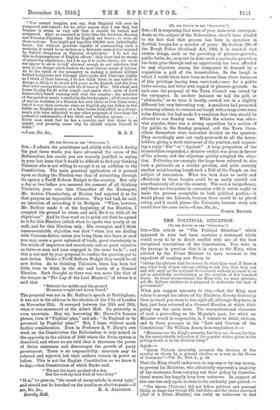[To mg EDITOR OP THY "SPECTATOR. " ] SIR, It is surprising
that none of your numerous correspon- dents on the subject of the Referendum should have alluded to the fact that that process has been in operation in Scottish burghs for a number of years. By Section 306 of the Burgh Police (Scotland) Act, 1892, it is enacted that certain things, such as the providing of pleasure-grounds, public baths, &c., may not be done until a particular procedure has been gone through and an opportunity has been afforded to any objectors among the ratepayers to demand by a requisition a poll of the householders. In the burgh in which I reside there have been no fewer than three instances of this privilege having been exercised,—once for a public baths scheme, and twice with regard to pleasure-grounds. In each case the proposal of the Town Council was vetoed by the ratepayers. In another instance we had the poll, or "plebiscite," as we term it locally, carried out in a slightly different but very interesting way. A syndicate had promoted a tramway scheme to connect our burgh with a large town some miles distant, but had made it a condition that they should be allowed to run Sunday cars. While the scheme was other- wise popular, there was a strong opposition by a section of the public to the Sunday proposal, and the Town Coun- cillors themselves were somewhat divided on the question. They accordingly sent out reply-postcards to all the house- holders, giving a short statement of the position, and request- ing a reply " For " or " Against." A large proportion of the householders responded, a decisive verdict was given in favour of the scheme, and the objectors quietly accepted the situa- tion. Following our example, the large town referred to also took a plebiscite on a similar question, and quite recently another neighbouring burgh took a Poll of the People on the subject of annexation. What has been done so easily and effectively in those burghs could be as easily carried out simultaneously all over the country. The cost is insignificant, and there are two points in connexion with it which ought to make the process acceptable to both political parties,—it would please the Liberals, because there would be no plural voting, and it would please the Unionists, because every vote would have the same value.—I am, Sir, &c.,
NORTH BRITON.






































 Previous page
Previous page